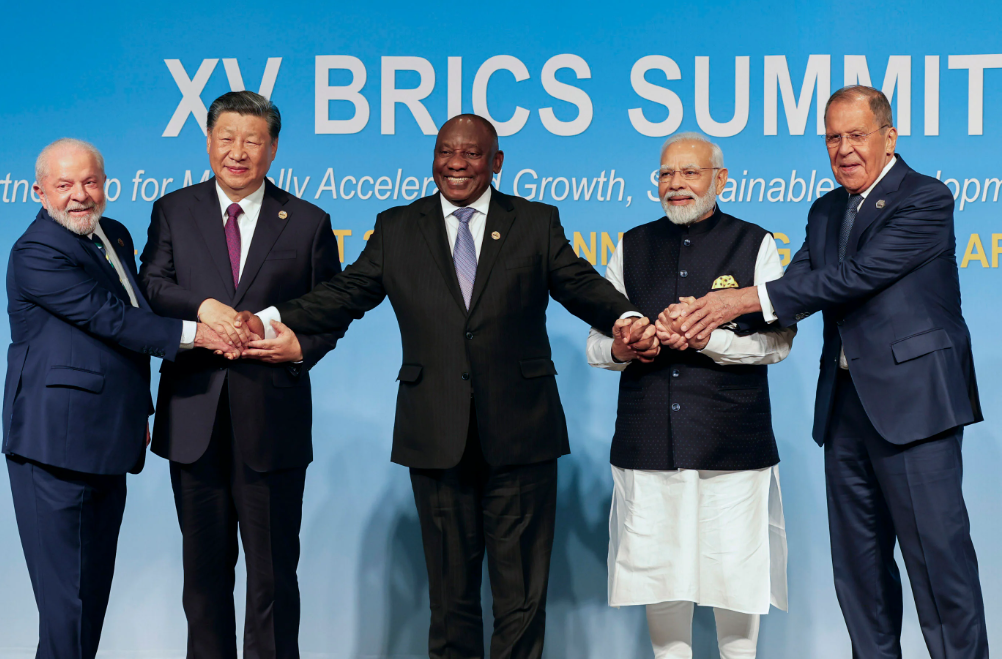
BRICS leaders pose for a group photograph during the 2023 summit. Photo: AP
At the invitation of South African President Cyril Ramaphosa, Chinese President Xi Jinping paid a state visit to the Republic of South Africa and attended the 15th BRICS Summit in Johannesburg. During his stay in South Africa, President Xi co-chaired the China-Africa Leaders’ Dialogue with President Ramaphosa.
A brief news release sent two important messages: First, China strongly supports the BRICS Year in South Africa. Second, China attaches great importance to strengthening relations with South Africa and with African countries in general.
South Africa hosted the summit this year in accordance with the practice of rotating the group’s leadership. However, it was by no means an easy task for South Africa. In March, the International Criminal Court in The Hague issued an arrest warrant for Russian President Vladimir Putin, alleging war crimes. South Africa, whose ICC membership obliges it to arrest anyone indicted by the ICC, thus finds itself in a dilemma. If South Africa yields to the ICC request and arrests Putin, it will undermine the credibility of President Ramaphosa and the ruling party, ANC, in the BRICS mechanism.
Former Russian president Dmitry Medvedev said that any country that dares to arrest Putin would be taking a step tantamount to declaring war on Russia. This means that should South Africa arrest Putin, it would be caught in a state of war. But if South Africa fails to arrest Putin, it would be seen as reneging on its ICC obligations and would be subjected to enormous pressure from the United States and the West, the ICC and the opposition parties in the country.
It is precisely because of this dilemma that rumors had been circulating that South Africa might withdraw from the ICC or hand over the presidency of the BRICS Summit to Beijing. China was the previous host, and when the rumor mill went into overdrive, President Xi talked with President Ramaphosa on the phone on June 9, expressing China's firm support for South Africa’s BRICS presidency and its endeavors in various BRICS cooperation activities this year. In early June, Chinese Vice Minister of Foreign Affairs Ma Zhaoxu — while attending the BRICS Ministerial Meeting and the Friends of BRICS meeting in Cape Town, South Africa — also expressed China’s full support for South Africa’s presidency and its willingness to work together with its BRICS partners to ensure a complete success for the BRICS Summit. China looks forward to welcoming new members to the BRICS family at an early date.
Wang Yi, then-director of the Central Foreign Affairs Office, traveled to Johannesburg, South Africa, in late July for the 13th BRICS Meeting of High Representatives for Security Affairs. He said at a meeting with South Africa’s foreign minister, Naledi Pandor, that the BRICS mechanism is the most important platform for representatives of emerging markets and major developing countries to strengthen dialogue and cooperation, and the most important channel for the global South to carry out strategic communication.
China fully supports South Africa as the BRICS chair in hosting the BRICS Summit, responding positively to the vigorous appeal of the countries concerned to participate in BRICS cooperation, promoting the further development and expansion of BRICS cooperation, making a stronger BRICS voice, upholding international justice, practicing multilateralism and providing more stability in a world filled with uncertainties.
In conclusion, as South Africa has faced unprecedented pressure in hosting the BRICS Summit, China has delivered staunch support and commitment to the South African government to convene the BRICS Summit smoothly, in line with its own best judgment and choices. Meanwhile, China attaches great importance to strengthening the bilateral relationship, as well as to building relations with African countries in general.
South Africa is China’s comprehensive strategic partner and the first African country to join the Belt and Road Initiative. This year also coincides with the 25th anniversary of the establishment of diplomatic relations between China and South Africa. South African scholars believe that the relationship has marched into a golden age. Pandor said that South Africa-China relations continue to run at a high level. South Africa adheres to the one-China principle and is willing to work with China to strengthen BRI cooperation and deepen cooperation in trade, investment, agriculture, energy, manufacturing, infrastructure and other areas. It wants to promote the further growth of bilateral relations, both in breadth and depth.
As a political, economic and diplomatic powerhouse on the African continent, South Africa also hopes to take the opportunity, in assuming the BRICS presidency, to elevate its influence in Africa and around the world. Therefore, South Africa has extended invitations to all African leaders to participate in the BRICS Summit —themed “BRICS and Africa: Partnership for mutually accelerated growth, sustainable development and inclusive multilateralism” — with a view toward promoting in-depth cooperation between BRICS and Africa.
From China's perspective, Africa has been the “foundation of the foundations” in Chinese diplomacy. To strengthen this foundation and further promote interaction between the BRI and the African continent, China will host the Third Belt and Road Forum for International Cooperation in Beijing in October this year, and play host to the ninth Forum on China-Africa Cooperation next year.
African countries, as important partners in BRI development, will surely be welcome as valued guests for the third BRI Forum and, with China, can explore ways to deepen cooperation leading up to the ninth China-Africa Cooperation Forum meeting next year.